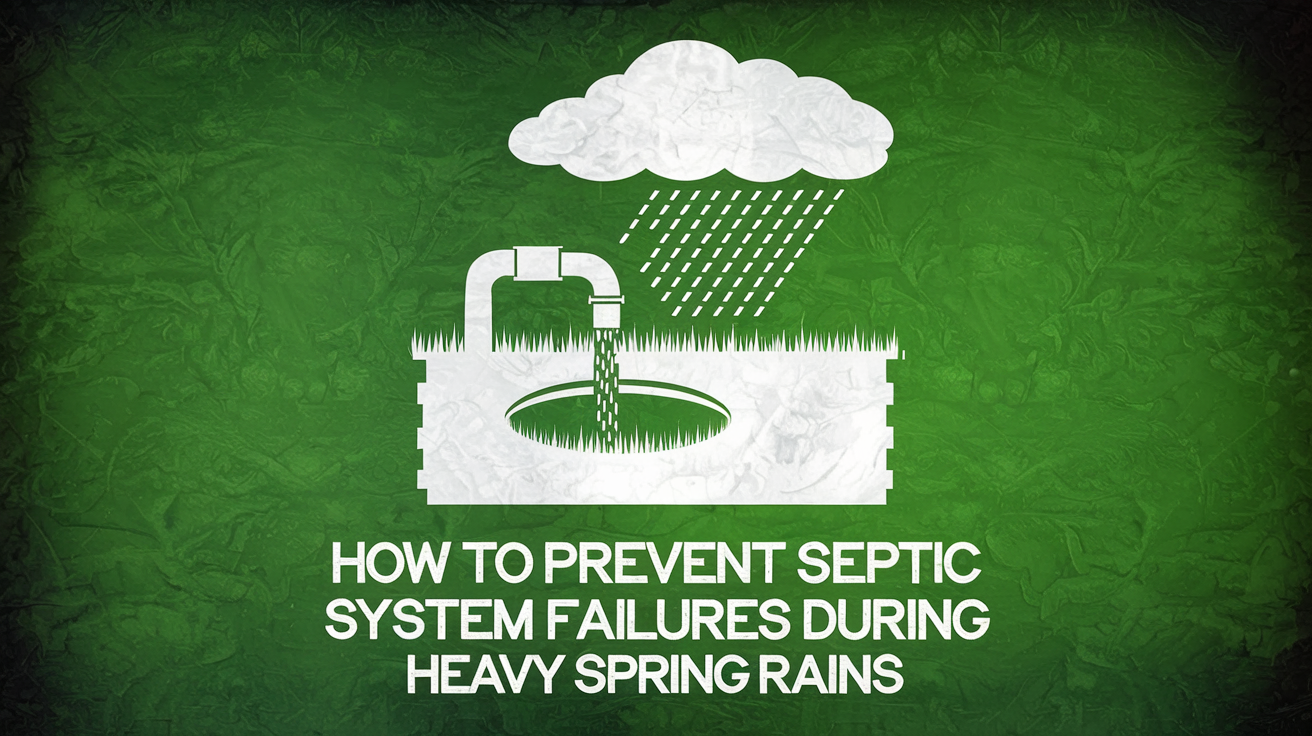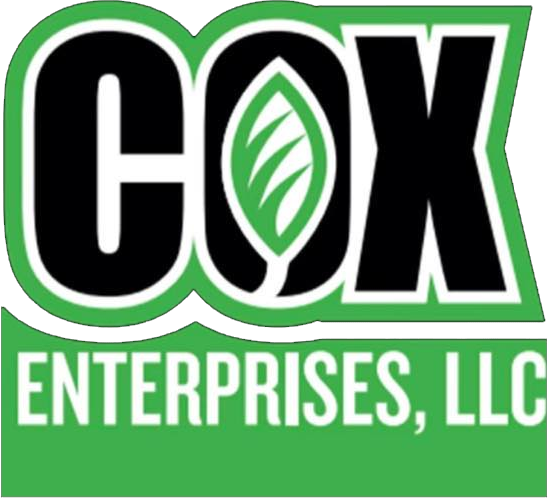Spring in Maryland brings beautiful blooms and greenery, but it also brings something less welcome for homeowners – heavy rainfall that can threaten your septic system. When excessive rain saturates the ground around your system, it can create serious problems that may lead to system failure, costly repairs, and even environmental hazards. At Cox Enterprises, we understand these challenges and want to help you protect your investment during Maryland’s rainy spring season.

How Rain Affects Septic Systems
Your septic system relies on properly draining soil to function effectively. The drainfield – a critical component of your system – needs unsaturated soil to properly filter wastewater. During heavy spring rains, several issues can develop:
Saturated Soil and Reduced Drainage
When the soil around your drainfield becomes saturated with rainwater, it cannot absorb additional wastewater from your septic tank. This creates a hydraulic overload situation where:
- The saturated soil prevents proper filtration and treatment of wastewater
- Bacteria that normally break down waste cannot function properly in waterlogged conditions
- The natural absorption process is significantly reduced or completely halted
This saturation is particularly problematic in Maryland’s clay-heavy soils, which already drain more slowly than sandy soils. After several days of spring rain, the ground may remain saturated for weeks, creating ongoing issues for your septic system.
Increased Risk of Backups and Flooding
As the drainfield becomes unable to accept wastewater, that water needs to go somewhere. Unfortunately, this often results in:
- Wastewater backing up into your home through sinks, toilets, and drains
- Surfacing of effluent above your drainfield, creating wet, smelly areas in your yard
- Potential contamination of groundwater and nearby water sources
- Increased pressure on septic tank components that can lead to cracks or failures
According to recent environmental studies, septic system failures during wet weather are among the leading causes of localized water contamination in rural Maryland communities. A properly functioning septic system protects not only your property but also the larger environment.
Preventative Measures for Spring Rains
Taking proactive steps before the heavy spring rains arrive can significantly reduce your risk of septic system failures. Here are essential preventative measures every Maryland homeowner should consider:
Regular Inspections and Pumping
The foundation of septic system health is regular professional maintenance:
- Schedule annual inspections to identify potential issues before they become major problems
- Have your tank pumped every 3-5 years (more frequently for larger households) to ensure it has capacity to handle additional water during rainy periods
- Check that baffles, filters, and other components are functioning properly
- Repair any minor issues immediately before they escalate during wet weather
These routine maintenance tasks are your first line of defense against rain-related septic problems. Learn more about our comprehensive septic system maintenance services.
Professional septic system inspections before the rainy season can identify vulnerabilities unique to your property. Our technicians can assess the condition of your drainfield, check for signs of potential failure, and recommend specific preventative measures based on your system’s age, design, and location.
Diverting Rainwater Away from the Drain Field
Minimizing the amount of rainwater reaching your drainfield is crucial during heavy spring rains:
- Ensure gutters and downspouts direct water away from your drainfield area
- Install landscaping features like swales, berms, or rain gardens to redirect surface water
- Consider French drains or other subsurface drainage systems for properties with persistent drainage issues
- Maintain proper grading around your home to prevent water from pooling near the septic system
Even simple adjustments to your property’s drainage can significantly reduce the burden on your septic system during heavy rainfall. Remember that every gallon of rainwater diverted from your drainfield is one less gallon your system needs to handle.
Reduce Water Usage During Heavy Rains
When heavy rains are forecast, reducing your household water use can help prevent system overload:
- Postpone laundry, dishwashing, and other high-water-usage activities until drier weather
- Take shorter showers and avoid baths during peak rainfall periods
- Fix leaky fixtures that add unnecessary water to your system
- Spread necessary water usage throughout the day rather than concentrated periods
By reducing your water consumption during rainy periods, you give your septic system breathing room to handle the additional environmental moisture. Even a 25% reduction in household water use can make a significant difference in preventing system failures.
Maintain Your Drain Field Area
The condition of your drainfield area plays a significant role in how well it handles excess moisture:
- Avoid compacting soil over the drainfield by keeping vehicles, heavy equipment, and livestock off the area
- Maintain appropriate vegetation over the drainfield to help absorb moisture (grass is ideal)
- Don’t plant trees or deep-rooted shrubs near the drainfield, as roots can damage pipes
- Keep the area clear of structures that might block evaporation or add weight to the soil
A well-maintained drainfield can process significantly more water than one that has been compacted or improperly landscaped. Simple yard maintenance practices can have a major impact on your septic system’s resilience during wet weather.
What to Do If Your Septic System Fails
Despite your best preventative efforts, severe or prolonged rainfall can sometimes overwhelm even well-maintained septic systems. Knowing how to respond quickly can minimize damage and health risks.
Signs of Failure and When to Call a Professional
Be alert for these warning signs that indicate your septic system is struggling:
- Slow drains throughout your home, especially in lower-level fixtures
- Gurgling sounds in pipes when water is draining
- Foul odors inside your home or around your drainfield area
- Unusually soggy areas in your yard, particularly over the drainfield
- Sewage backing up into toilets, tubs, or sinks
- Unusually lush, green grass over the septic field, even during dry periods
If you notice any of these signs during or after heavy rainfall, don’t delay in calling for professional assistance. Our septic system repair services can quickly address issues before they cause extensive damage to your home and property.
Emergency Measures While Waiting for Help
While awaiting professional assistance, take these immediate steps:
- Stop all non-essential water use in your home
- Rope off any areas where sewage has surfaced to prevent exposure
- Keep children and pets away from affected areas
- Do not attempt to open or repair septic components yourself
- If sewage has backed up into your home, wear protective gear during cleanup
- Document the conditions with photos for insurance purposes
Remember that a failing septic system poses serious health risks. Raw sewage contains harmful bacteria and pathogens that can cause illness. Professional remediation is essential for proper cleanup and system repair.
Long-term Solutions After a Failure
After addressing the immediate emergency, work with septic professionals to implement long-term solutions:
- Consider system upgrades that improve drainage and capacity
- Install water-saving fixtures throughout your home to reduce system load
- Implement additional drainage solutions around your property
- Develop a more frequent maintenance schedule based on your system’s vulnerabilities
- Explore modern septic technologies designed to handle challenging conditions
Many homeowners find that investing in system improvements after a failure is more cost-effective than dealing with repeated emergency repairs.
Conclusion
Spring rains don’t have to spell disaster for your septic system. With proper preparation, maintenance, and quick action when problems arise, you can protect your system and your property from the challenges of Maryland’s wet spring season.
At Cox Enterprises, we’re committed to helping homeowners maintain healthy, reliable septic systems in all weather conditions. Our experienced technicians provide comprehensive inspection, maintenance, and repair services to keep your system functioning properly year-round.
Don’t wait for problems to develop – schedule your spring septic system inspection today. Contact Cox Enterprises at [phone number] or visit our website to book your appointment and ensure your system is ready for whatever weather comes your way.

